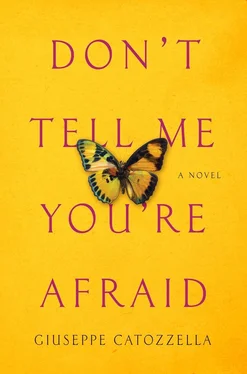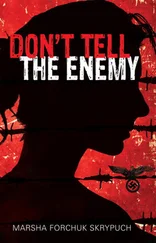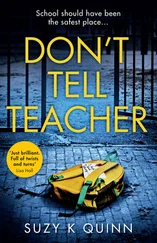All I could do was wait.
Pray, wait, and read. In fact there were letters in that prison. In Arabic, in Somali, in Ethiopian, and in English, left there somehow, for some reason, tossed aside in a corner, accumulated over years and years. Letters from prisoners or from their loved ones. Maybe they were mementos of the dead that the guards had never had the nerve to discard. In those letters there were lives. And so, reading them, I rediscovered what no longer existed inside of me. Life. Memories. Love. Promises. Courage. Hope. There were some from a man who wrote to his wife every day. Each morning when the sun rose. A young woman who, dreaming, wrote hopeful words to her two-year-old son, who’d been left in Somalia. A little boy who asked his father and mother to be brave, in letters that were never delivered. They were orphaned words, which had never reached their destination. I liked to think that they were meant for me.
In those two months all I did was read and sleep. I hadn’t had the energy to train for some time. If the individuals who had written those yellowed letters had had the strength to write what they’d written, I could make it too. I reread them continually, learning my favorite passages by heart.
There was also an Internet connection. I had a young Somali man lend me a few cents, and every now and then I e-mailed Hodan. In the days that followed, I lived in expectation of her reply. She told me that everything was fine in Helsinki and that she couldn’t wait for me to get there. She cheered me up, telling me to remember that it would all be over soon.
Lying on the hard, tick-infested mat, I asked myself if it was all worth it. My answer was no. Why had I let myself in for this? All I wanted was to be a two-hundred-meter champion. No one in the world, over the brief course of his life, should have to go through this hell.
One evening a group of three Somali men escaped from the prison. The guards had forgotten to bolt the door. I’d met one of the three men, Abdullahi, a couple of weeks ago; he’d lent me the money for the Internet. I’d told him my story. He remembered the race in Beijing. He said his wife had told him about me. She had remained in Mogadishu; he would support her, sending her money every month, once he got to Italy. We’d become friends. We talked, we confided in each other, and occasionally we ate together. At first he didn’t believe it was me; he thought I’d made it all up. It didn’t seem possible that I had been reduced to sleeping with fleas in a prison in the Libyan desert.
The guards brought us supper, rice and vegetables and half a liter of water; then they left for the night. That evening they hadn’t locked up, and Abdullahi came to me and asked if I wanted to join them. They would escape when night fell and walk to the town of Ajdabiya. The following morning they would find a way to get to Tripoli from there. It wasn’t complicated, but if they were caught, they’d be killed.
I had to decide. I had only two hours and I couldn’t talk about it to anyone.
Five months ago I would have said yes. That evening I said no to Abdullahi. I think Aabe was pleased with me. I would stay there and wait for money from Hodan and Hooyo.
The men left two hours later and we never heard anything more about them.
Then, at last, the money came. I left the letters to a sweet Somali girl who had just arrived, depleted and tearful. I told her that reading them would save her life. There they were and no one paid any attention to them. Yet it was only thanks to them that I had survived that prison.
I was alive, in fact, and free at last. I would travel with nine other people in the trailer of a truck carrying sacks of corn flour. The most comfortable leg of the Journey.
Still sleeping in the trailer, we made a two-day stop in Sirte to wait for a few other tahrib .
Then we set off again.
Finally, after a week, I was in Tripoli.
It was December 15, 2011. Exactly five months since my departure from Addis Ababa. A year after leaving Mogadishu.
I was free.
When we heard the sounds of the city from inside the trailer, we began to cry. Ten wraiths weeping silently inside the trailer of a truck. Ten wraiths who were ashamed of their tears. All the same, those tears brought us together. That’s what happens when you cry as one. I will always carry with me those nine tearful faces. They will always be my brothers and I their sister. I realized that I hadn’t cried in months. The desert had drained me of everything, even my tears, my saliva. It had drunk them all up.
When we stopped in a big square and they told us to get out, I felt light as air. I could barely stand on my feet, but by some miracle my brain began to function.
They abandoned us in that busy square; it was almost sunset, and several stalls selling sweets and kebabs were closing up. Ten wraiths covered with sand, smelly and filthy like pigs.
Ten wraiths among the Libyan inhabitants.
The traffickers opened the trailer and said: “You’re free.”
Then they climbed back into the cab and drove off, raising a big cloud of dust and leaving us there to breathe the diesel fumes that by now were part of our lungs.
We found ourselves lost. And famished.
No, we found ourselves.
I was free.
Free as the air, free as waves breaking in the sea.

IN TRIPOLI I LIVED for almost a month in the Somali district. All of us Somali and Ethiopian tahrib waiting to embark for Italy occupied about a dozen buildings crowded together in the same neighborhood east of the city. An ugly, dirty area fit for illegals and sewer rats like us. Yet from the very first moment my arrival in Tripoli was a liberation. I never wanted to see the desert again for the rest of my life; that much I was sure of.
There was nothing I hated more than the desert. When you spend months there, the desert gets into your bones, your blood, your saliva; you can’t ever get it out of you. You carry the dust everywhere; even if you wash with running water it stays with you forever. But the worst thing is that the desert extinguishes your soul, it obliterates your thoughts. You have to close your eyes and imagine things that aren’t there. Months and months of stretches of sand. Wherever you turn, at whatever time of day or night. Only sand and nothing but sand. It drives you insane.
Once I got to Tripoli, I realized that it was a miracle that I’d survived. It was only thanks to those yellowed letters and to the Olympics that I’d come through sane and not stark, raving mad. It’s only when you see the light after being in the dark a long time that you remember the color of things.
That’s what happened to me. I remembered what the world was like. And I loved it.
We lived in cramped rooms. Thirty or forty people in each apartment. I was with forty women from all over Africa: All the illegal emigrants meet up in Tripoli. There were Nigerians, Congolese, Somalis, Ethiopians, Sudanese, women from Namibia, Ghana, Togo, the Ivory Coast, Biafra, Liberia. Adults, adolescents, young women, little girls, old ladies. All together and finally safe.
We felt safe. We were in a city; there was everything we needed to live: water, fruit, food. It was all there and no one would snatch it away from us or beat us. I would have stayed in Tripoli for a lifetime, as many thought they’d do once they got there, if it hadn’t been for the fact that we were tahrib and the police had it in for us as a result of agreements made between the Libyan and Italian governments. If caught, we were to be sent back to our own countries. We knew that.
Nevertheless, we weren’t interested in living undercover in those days. If we’d made it that far — some in two months, some in two years, some, like me, in five months — if we had overcome the Sahara, if we were survivors, all we could think of at that point was reaching our destination. Only the destination. Everything else was eclipsed. For us tahrib in Tripoli there was only that one goal. Tripoli for us was a transit point, a faint breath of wind, the rustling of a leaf, the blink of an eye.
Читать дальше





![Ally Carter - [Gallagher Girls 01] I'd Tell You I Love You But Then I'd Have to Kill You](/books/262179/ally-carter-gallagher-girls-01-i-d-tell-you-i-lo-thumb.webp)







